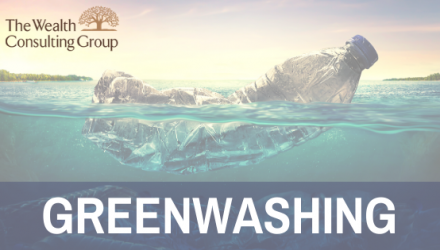By Brittany Damico, Business Development Specialist, The Wealth Consulting Group
When you make the decision to align your personal values with your purchasing power as a consumer, you have the ability to shape the economy. Most of us do this every time we make a decision to purchase one product over another, we cast our vote for that company. As you begin consciously casting these votes, you may come face to face with one notable question, “How can I ensure the companies I’m supporting are actually telling the truth about their sustainability initiatives?” In order to answer this, it’s helpful to understand the difference between green marketing and “greenwashing”. Greenwashing occurs when a company intentionally misrepresents their environmental friendliness in order to deceive consumers [1]. After Larry Fink, the CEO of BlackRock, made his announcement declaring environmental sustainability as a core focus moving forward [2] and many others following suit, the term greenwashing or “green sheen” began trending around the water cooler. While the term has been around since the 1960’s, it’s been a growing conversation as sustainability continues to govern the competitive advantage for corporations.
How does it work?
Greenwashing comes in many shapes and sizes and can be seen across all industries. Some of the most common forms of greenwashing are misleading imagery on packaging, being purposefully vague about their sustainability practices, or exaggerating deceptive and confusing sustainability initiatives. If a company is involved in greenwashing, they may use these techniques to make their products appear healthier, free of chemicals, sustainably sourced, or recycled when that is not the whole truth.
Examples of greenwashing
In an attempt to hedge the deceptive traps of greenwashing, The U.S. Federal Trade Commission (FTC) has created the “Green Guides”. These are voluntary guidelines designed to help marketers avoid making misleading or unsubstantiated claims about their environmental practices. The following are examples of unsubstantiated greenwashing claims directly from the FTC website [3]:
- A plastic package containing a new shower curtain is labeled “recyclable.” It is not clear whether the package or the shower curtain is recyclable. In either case, the label is deceptive if any part of the package or its contents, other than minor components, cannot be recycled.
- An area rug is labeled “50% more recycled content than before.” The manufacturer increased the recycled content from 2% to 3%. Although technically true, the message conveys the false impression that the rug contains a significant amount of recycled fiber.
- A trash bag is labeled “recyclable.” Trash bags are not ordinarily separated from other trash at the landfill or incinerator, so they are highly unlikely to be used again for any purpose. The claim is deceptive since it asserts an environmental benefit where no meaningful benefit exists.
Can I easily avoid it?
This information may leave you feeling a little defeated about corporate America, but fear not! There’s a growing number of companies making huge strides in reducing their negative environmental impact. When you’re in the stores, be mindful about the level of detail provided about the company’s sustainability claims. Is the information confusing? Hard to find? Is the product claiming to be better than a competitor with no substantiated claim? These questions can help you quickly determine whether a company is the real deal or just greenwashing. For additional information about consumer protection again misleading marketplace claims, please visit https://www.ftc.gov/news-events/press-releases/2012/10/ftc-issues-revised-green-guides.
How The Wealth Consulting Group can Help
The presence of ESG (Environmental, Social, Governance) screening within investment markets is supporting the movement toward transparency and corporate social responsibility. This drive toward meaningful environmental impacts and transparent sustainable practices are becoming crucial for a company’s ability to show that it has the right to exist in the current market. At The Wealth Consulting Group, our ESG screened High Impact Portfolios are dedicated to positive social and sustainable impact through a conscious allocation of capital. If you would like to learn more about these topics and our High Impact Portfolios, please reach out to your trusted WCG advisor.
The opinions voiced in this material are for general information and are not intended to provide specific advice or recommendations for any individual.
An Environmental, Social and Governance (ESG) fund’s policy could cause it to perform differently compared to funds that do not have such a policy. No strategy assures success or protects against loss. WCG Wealth Advisors, The Wealth Consulting Group and LPL Financial are separate entities from BlackRock.
Sources

